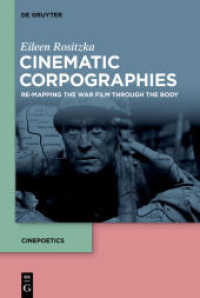Full Description
Indigenizing Education: Transformative Research, Theories, and Praxis brings various scholars, educators, and community voices together in ways that reimagines and recenters learning processes that embody Indigenous education rooted in critical Indigenous theories and pedagogies. The contributing scholar-educators speak to the resilience and strength embedded in Indigenous knowledges and highlight the intersection between research, theories, and praxis in Indigenous education. Each of the contributors share ways they engaged in transformative praxis by activating a critical Indigenous consciousness with diverse Indigenous youth, educators, families, and community members. The authors provide pathways to reconceptualize and sustain goals to activate agency, social change, and advocacy with and for Indigenous peoples as they enact sovereignty, selfeducation, and Native nation-building.
The chapters are organized across four sections, entitled Indigenizing Curriculum and Pedagogy, Revitalizing and Sustaining Indigenous Languages, Engaging Families and Communities in Indigenous Education, and Indigenizing Teaching and Teacher Education. Across the chapters, you will observe dialogues between the scholar-educators as they enacted various theories, shared stories, indigenized various curriculum and teaching practices, and reflected on the process of engaging in critical dialogues that generates a (re)new(ed) spirit of hope and commitment to intellectual and spiritual sovereignty. The book makes significant contributions to the fields of critical Indigenous studies, critical and culturally sustaining pedagogy, and decolonization.
Contents
Series Foreword—Research for Social Justice: Personal-Passionate-Participatory Inquiry; Ming Fang He and JoAnn Phillion.
Introduction; Jeremy Garcia and Valerie Shirley.
Acknowledgments; Ahxe'hee (Dine)/Kwa'kwha (Hopi).
Section I. Indigenizing Curriculum And Pedagogies.
Chapter 1. Native Intellectualism Through Indigenous Social Justice Pedagogy: Learning as a Critical and Heartfelt Engagement; Valerie Shirley.
Chapter 2. Transformative Praxis: I Have 180 Days With These Kids... the Community Has Them for Life; Samuel Tenakhongva.
Chapter 3. Restorying Lessons Learned From a High School Native American Literature Classroom; Timothy San Pedro and Andrea Box.
Chapter 4. The Hawaiian Culture-Based Education Movement: Advancing Native Hawaiian Students in Public P-12 Schools Through an Indigenous Framework; Walter Kahumoku III.
Chapter 5. Transformative Praxis: Rooted in Home Before Looking Elsewhere; Monica A. Ka'imipono Kaiwi.
Section II. Revitalizing And Sustaining Indigenous Language.
Chapter 6. Teaching for Hơzhơ and Wơlakhota: Relationships, Wellness, and Language Revitalization at the Native American Community Academy; Tiffany S. Lee.
Chapter 7. Transformative Praxis: Wơlakhota—Reclaiming Language and Unlocking Identity; Anpao Duta Flying Earth.
Chapter 8. Chikashshanompaat Bílli'ya: The Chickasaw Language Is Forever; Kari A. B. Chew.
Chapter 9. Transformative Praxis: Keeping the Fire Burning: The Impact of Community Indigenous Language Teachers in the Classroom; Michelle Scaggs Cooke.
Chapter 10. Educational Leaders Centering Yuuyaraq and Asserting Rhetorical Sovereignty to Support Youth Development, Linguistic Survivance, and Climate Change Adaptation; Ataugg'araq Grant Kashatok and Leisy Wyman.
Chapter 11. Hopilavayit aw Naa'aya'tiwqam, Those Who Have Chosen to Attend to the Hopi Language: Storying The Making of an Indigenous Language Teacher; Bernita Duwahoyeoma, Ada Curtis, and Sheilah E. Nicholas.
Section III. Engaging Families And Communities In Indigenous Education.
Chapter 12. Centering Indigenous Philosophies of Community in Family, Community, and School Engagement; Hollie Anderson Kulago and Tsiehente Herne.
Chapter 13. Engaging Native Families in Co-Creating Meaningful Educational Opportunities as a Community; Danielle R. Lansing.
Chapter 14. Transformative Praxis: Cherished Hopes: Building a Relationship With Families for Success; Vibeka Mitchell.
Chapter 15. Indigenizing Place-Based Education in Early Learning: Co-Creating Curriculum With Indigenous Communities at a Tribal College; Nahrin Aziz.
Chapter 16. Transformative Praxis: Indigenizing Education in Early Learning: Connecting Curriculum to Community; Oomagelees (Cynthia Wilson).
Chapter 17. Community-Centered Digital Storywork to Revitalize Indigenous Knowledges; Christine Rogers Stanton.
Chapter 18. Transformative Praxis: Piikani Digital StoryWork: Community-Centered Digital Stories in Practice; Brad Hall, Cinda Burd-Ironmaker, and Eric Cox.
Section IV. Closing Section: Indigenizing Teaching And Teacher Education.
Chapter 19. Conclusion: A Call to Action: Indigenous Teaching and Teacher Education; Keiki Kawai'ae'a, Jeremy Garcia, renée holt, Ac'aralek Lolly Carpluk, and Valerie Shirley.
About the Editors.
About the Contributors and Artist.





